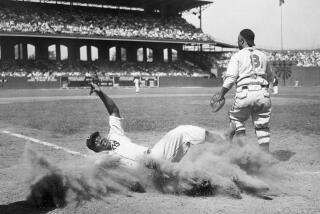Skimming now a federal case
DALLAS -- When Ronaldo Peralta was asked to head up the office in charge of enforcing Major League Baseball’s regulations in the Dominican Republic a few years back, it was like sending a single sheriff into a lawless town in the Old West.
“People would pull guns on each other sometimes,” he said shortly after taking over. “Well, they still do that. But not as much.”
No, nowadays baseball is confronting a different kind of lawlessness in the Dominican. And it has the potential to shake the game there to its core.
Federal agents, following up on baseball’s own two-month investigation, have been interviewing representatives of all 30 major league teams after the May firing of Dave Wilder, the Chicago White Sox’s senior personnel director, and two White Sox scouts.
According to the Chicago Tribune, investigators are looking into whether Wilder may have pocketed portions of the bonuses the White Sox gave him to sign Dominican prospects. Ross Rice, a spokesman for the FBI office in Chicago, said no criminal charges have been filed.
Wilder has said nothing publicly since his firing.
“The FBI’s going to all the organizations . . . asking players if they received or gave money,” said Clay Daniel, international scouting supervisor for the Angels, whose Dominican-based scouts have already been interviewed. “I’m sure they’re looking into scouts, personnel, people like that that may have had a hand in it.”
And it may go higher than that. Several baseball sources, all of whom said their jobs would be jeopardized if they spoke on the record about a federal investigation, say at least one general manager has already come under suspicion.
Peralta and officials in the commissioner’s office declined to comment, citing the ongoing investigation. But according to Daniel and others, the recent escalation of bonuses that teams are paying in Latin America has made it easier and more profitable to skim money from players and teams.
Dominican scouts, known on the island as buscones, or “searchers,” have been doing that for at least a decade. Many tell families up front they will take 30% or more of a player’s bonus when he signs, then play teams off one another in negotiations to drive that bonus -- and, consequently, their cut -- higher.
One thing the feds will investigate is whether team representatives have become complicit in that practice in exchange for a kickback. One National League executive, who insisted on anonymity, said he offered a $60,000 bonus to a prospect a couple of years ago only to have the buscon demand 10 times that much. Three months later, the executive said, the player signed with another team for more than $1.5 million.
“You think in three months a guy can improve by $1 million?” he said. “Something funny must have happened there. It’s not only the buscones. The first case was the Chicago White Sox. And you will see in the future, other names are going to be coming out.
“I don’t blame the buscones. I blame the major league organization’s people with the responsibility to approve that big bonus.”
Added an executive with one American League club: “We’re going to crash and burn because these numbers are ridiculous. Ultimately something needs to change.”
That doesn’t appear likely to happen any time soon though. In fact, the pendulum is continuing to swing the other way.
Last year the 30 big league teams signed 511 Dominicans for an average bonus of $65,821 -- double the average teams paid three years ago and more than 30 times what the Athletics paid to sign former American League most valuable player Miguel Tejada in 1993.
Then last week, at the same time the feds were presumably looking under every rock, Oakland gave a $4.25-million signing bonus to 16-year-old Dominican pitcher Michael Inoa. Although no one is suggesting the Athletics did anything wrong, the bonus is nearly $2 million higher than the previous record for a Latin amateur not from Cuba. The Reds and Rangers offered even more.
“Some of the money being given out is appalling,” Daniel said. “Absolutely appalling.”
Dodgers scout Ralph Avila, who helped open the floodgates to Dominican talent when he inaugurated the first training academy there 22 years ago, fears things have gotten so out of hand that the only way to bring order would be to make Dominican players subject to the draft, an idea that has been discussed before.
It has also happened before -- in 1989, when baseball, in an effort to rein in bonuses, expanded its amateur draft to include Puerto Rico. And now, almost 20 years later, many in Puerto Rico blame that decision for the demise of baseball on the island, where the once-prestigious winter league folded.
“Between the baseball academies and the Dominican summer league, we built la gallina de oro, the golden hen,” Avila said. “Now it’s a real mess. The market is crazy.
“A worldwide draft would kill la gallina de oro.”
Maybe. But having every contract subject to FBI approval is hardly a recipe for success.--
More to Read
Sign up for Essential California
The most important California stories and recommendations in your inbox every morning.
You may occasionally receive promotional content from the Los Angeles Times.











